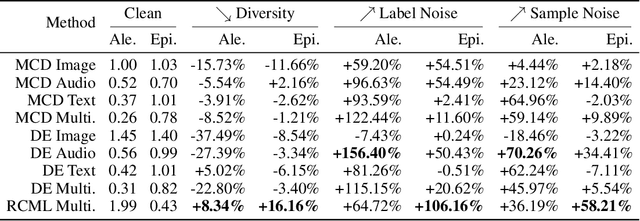Laure Berti-Équille
MixMAS: A Framework for Sampling-Based Mixer Architecture Search for Multimodal Fusion and Learning
Dec 24, 2024Abstract:Choosing a suitable deep learning architecture for multimodal data fusion is a challenging task, as it requires the effective integration and processing of diverse data types, each with distinct structures and characteristics. In this paper, we introduce MixMAS, a novel framework for sampling-based mixer architecture search tailored to multimodal learning. Our approach automatically selects the optimal MLP-based architecture for a given multimodal machine learning (MML) task. Specifically, MixMAS utilizes a sampling-based micro-benchmarking strategy to explore various combinations of modality-specific encoders, fusion functions, and fusion networks, systematically identifying the architecture that best meets the task's performance metrics.
Multimodal Learning with Uncertainty Quantification based on Discounted Belief Fusion
Dec 23, 2024Abstract:Multimodal AI models are increasingly used in fields like healthcare, finance, and autonomous driving, where information is drawn from multiple sources or modalities such as images, texts, audios, videos. However, effectively managing uncertainty - arising from noise, insufficient evidence, or conflicts between modalities - is crucial for reliable decision-making. Current uncertainty-aware ML methods leveraging, for example, evidence averaging, or evidence accumulation underestimate uncertainties in high-conflict scenarios. Moreover, the state-of-the-art evidence averaging strategy struggles with non-associativity and fails to scale to multiple modalities. To address these challenges, we propose a novel multimodal learning method with order-invariant evidence fusion and introduce a conflict-based discounting mechanism that reallocates uncertain mass when unreliable modalities are detected. We provide both theoretical analysis and experimental validation, demonstrating that unlike the previous work, the proposed approach effectively distinguishes between conflicting and non-conflicting samples based on the provided uncertainty estimates, and outperforms the previous models in uncertainty-based conflict detection.
Hierarchical Classification for Automated Image Annotation of Coral Reef Benthic Structures
Dec 11, 2024Abstract:Automated benthic image annotation is crucial to efficiently monitor and protect coral reefs against climate change. Current machine learning approaches fail to capture the hierarchical nature of benthic organisms covering reef substrata, i.e., coral taxonomic levels and health condition. To address this limitation, we propose to annotate benthic images using hierarchical classification. Experiments on a custom dataset from a Northeast Brazilian coral reef show that our approach outperforms flat classifiers, improving both F1 and hierarchical F1 scores by approximately 2\% across varying amounts of training data. In addition, this hierarchical method aligns more closely with ecological objectives.
LUMA: A Benchmark Dataset for Learning from Uncertain and Multimodal Data
Jun 14, 2024



Abstract:Multimodal Deep Learning enhances decision-making by integrating diverse information sources, such as texts, images, audio, and videos. To develop trustworthy multimodal approaches, it is essential to understand how uncertainty impacts these models. We introduce LUMA, a unique benchmark dataset, featuring audio, image, and textual data from 50 classes, for learning from uncertain and multimodal data. It extends the well-known CIFAR 10/100 dataset with audio samples extracted from three audio corpora, and text data generated using the Gemma-7B Large Language Model (LLM). The LUMA dataset enables the controlled injection of varying types and degrees of uncertainty to achieve and tailor specific experiments and benchmarking initiatives. LUMA is also available as a Python package including the functions for generating multiple variants of the dataset with controlling the diversity of the data, the amount of noise for each modality, and adding out-of-distribution samples. A baseline pre-trained model is also provided alongside three uncertainty quantification methods: Monte-Carlo Dropout, Deep Ensemble, and Reliable Conflictive Multi-View Learning. This comprehensive dataset and its tools are intended to promote and support the development and benchmarking of trustworthy and robust multimodal deep learning approaches.
 Add to Chrome
Add to Chrome Add to Firefox
Add to Firefox Add to Edge
Add to Edge